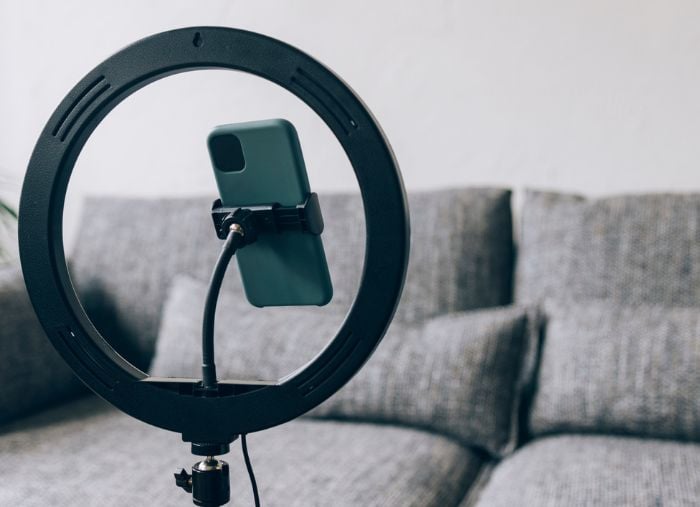On average, a video posted by a business on TikTok gets 17,523 views.

Look at all that love for pumpkin spice.
Just think of all the brand awareness and engagement you’ll get if you post a dozen times a day!
Not so fast. There is a diminishing return if you bombard the platform with content—especially if you’re pushing out subpar posts for the sake of more views.
The truth is, how often you should post on TikTok depends on a bunch of factors, and it’s unique to everyone. Your goals, capacity, audience, and industry all come into play.
But TikTok posting frequency does matter—the platform loves to serve up fresh, creative content. In this guide, we’ll show you how to figure out the right TikTok schedule for your goals and give you seven tips to keep up the cadence without losing content quality.
Contents
- How often TikTok says you should post
- How often the data says you should post on TikTok
- How to find your ideal TikTok posting frequency
- 7 tips to keep up with your TikTok posts
How often TikTok says you should post
Let’s start with what the platform itself tells us about posting frequency. According to TikTok, you should post between one to four times per day.
If that feels like a lot, it is. Especially when you consider that posting three to five times per week on Instagram Reels is the norm.
It’ll help to remember that your videos don’t need Avatar-level production quality. Even TikTok says that authenticity is more important than big-budget production.
A simple background and your phone’s camera are enough if you have good information to share.
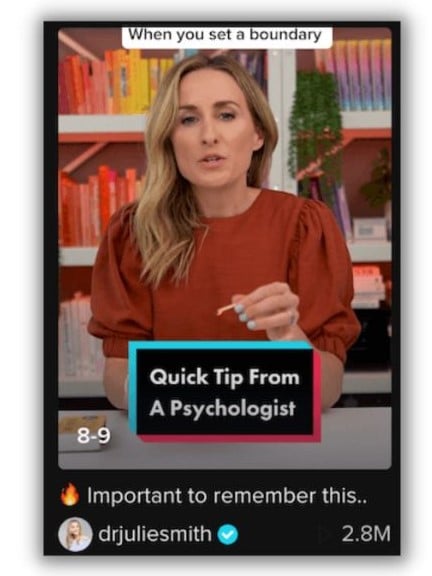
Plus, as you’ll learn next, most brands aren’t posting to TikTok nearly that often.
💡TikTok is great, but it’s not the only way to drum up more sales. Check out this guide to get 30 more ways to promote your business (with or without spending money).
How often the data says you should post on TikTok
The more you post, the more content the TikTok algorithm has to keep people on its platform. So of course, it says to post multiple times each day. But how often do brands post in the real world?
SocialInsider conducted a study comparing TikTok to Instagram Reels and YouTube shorts. Three interesting points emerge from the report:
- Brands post on TikTok about 16 times per month on average.
- That’s just over one post every two days, a far cry from TikTok’s suggestion.
- It’s still double the pace they post on other short-form video platforms.
In another review by RivalIQ, the average brand was only pushing content to TikTok 1.75 times a week. Even the most active brands posted just five times every week, according to that data.
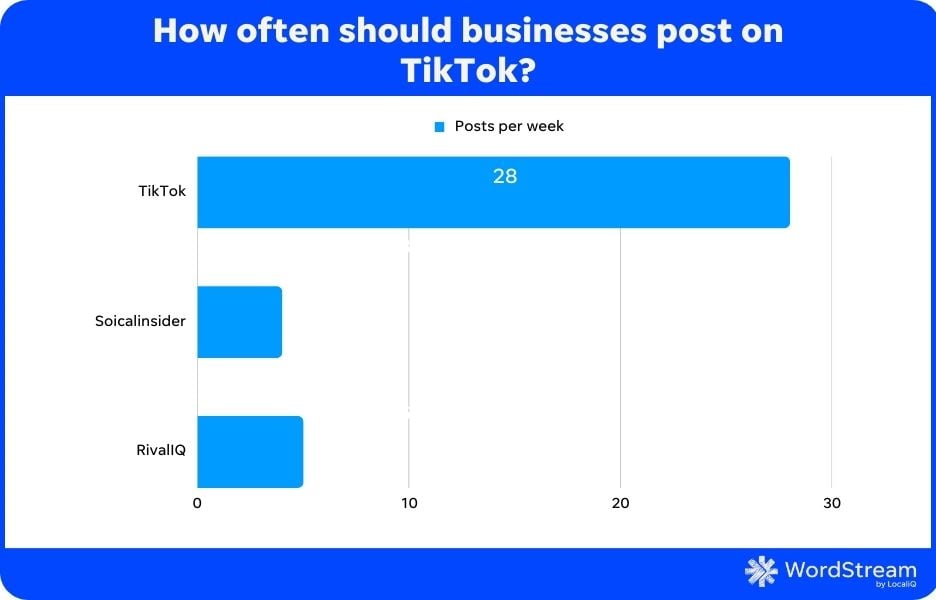
The takeaway is that you probably don’t need to hit TikTok’s posting quota. But you should consider a higher posting frequency than you use on other short-form video platforms.
How to find your ideal TikTok posting frequency
We’ve seen that the recommendations and data for how often you should post on TikTok are all over the place. Instead of relying on outside sources to set your schedule, let’s look at a few ways you can determine the absolute best posting frequency for your unique situation.
Be real about your creative capacity
The key to growth on TikTok is landing on the For You Page (FYP) of as many viewers as possible. That’s how new content, and companies, get discovered.

To get there, you have to share content people want to watch. If that means slowing down a little and posting less frequently, that’s okay. If you push a bunch of posts up that people scroll past, you’ll just have more videos no one sees—and a bunch of wasted effort for your troubles.
Consider your type of content
The type of content you post is an important consideration of your TikTok marketing strategy. Does your audience crave 30-second comedy clips? Or do they want longer Q&As with your team of experts.

Those longer videos take more to produce so you’ll be able to post less often. Plus, your viewers might get fatigued with too many deep dives in a week—which could push them to scroll past your multiple posts.
Review your industry’s competitiveness
Some categories like beauty and interior design are more popular on TikTok. That means two things where posting frequency is concerned:
- There’s an appetite for more content
- There’s more competition
So if you’re in a busy space on TikTok, you’ll need to nudge your posting schedule up.
Not sure where your industry lands? Look at popular accounts in your field to get the idea. If they’re getting followers with a couple of posts each week, that’s a good target to start with. If they’ve got two new videos up every day, well, read our tips below to up your posting game.
Test and track your analytics
Still not sure how many times you should post on TikTok every week? Just ask your audience. They’ll tell you by way of the analytics in your TikTok account.
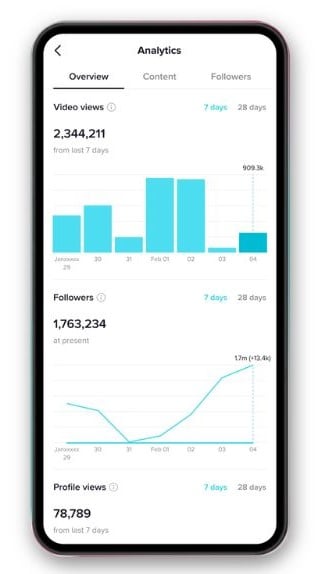
Try a different cadence each week and watch what happens to total and per-video view count. Also look at your profile views and new follower counts. Those will tell you if people are hungry for more or tired of your posts.
7 tips to keep up with your TikTok posts
The two things that slow most TikTok creators down are coming up with new ideas and having enough time to shoot and edit each TikTok video. These tips will help you create a pipeline of creative greatness with less time and effort.
1. Use Duet and Stitch
One of the worst-kept secrets of successful TikTok creators is that you don’t have to come up with every novel idea on your own. In fact, TikTok encourages collaboration with two features called Duet and Stitch.
A Duet lets you add your video to an existing TikTok, showing each side-by-side.

A Stitch is similar, but instead of playing next to an existing TikTok, your video plays after it.

In both cases, you build on an existing, successful video which is way easier than thinking up brand-new concepts.
Here’s an example from PUMA. The brand showed a barista’s hack for brewing coffee and PUMA’s hilarious result while trying to copy it.
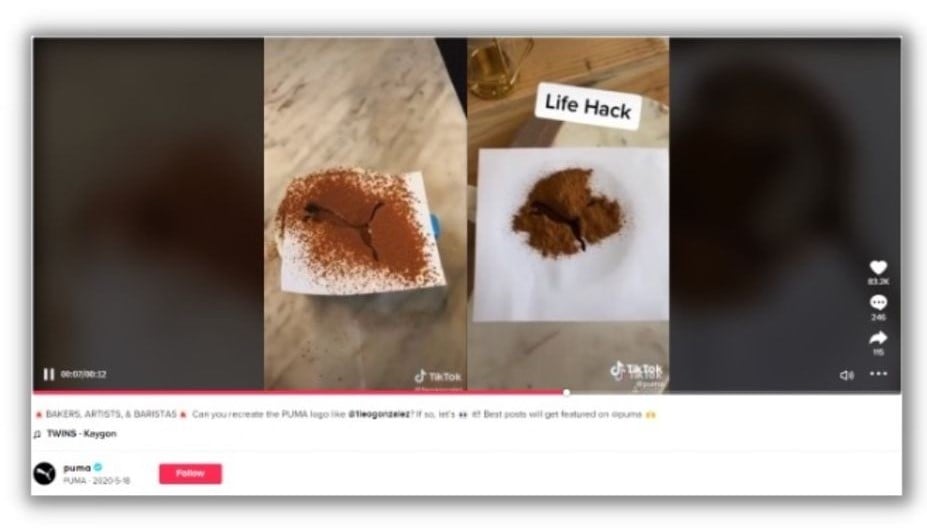
2. Work with other brands and creators
You don’t have to do all the heavy lifting of social media marketing yourself. Find a popular creator and let them introduce your brand and products to their audience.
Minute Maid racked up nearly 20,000 likes on this collab with Spencerx.

Don’t worry about finding the biggest TikTok stars. Look for micro-influencers that have an engaged following that would likely love what you do.
3. Repurpose content from other platforms
If you’re already publishing Instagram Reels or long-form video content to YouTube, then you have some assets that’ll speed up TikTok posting.
Take a Reel, tweak it a bit, and repost it on TikTok. Or break apart your 30-minute YouTube tutorial and either post the bits on TikTok or make a trailer that leads people to the full video.

4. Use TikTok ads
Paying for TikTok ads won’t necessarily help you post faster. But it could change how often you should post on TikTok in the first place.
Why? Because with a paid post and the right bid strategy, you can place your content in front of a very targeted audience. So you could get away with posting less because each ad will be seen by the very people who want to engage with your brand and buy what you sell.

And if you need inspiration for your ads, just creep TikTok’s public ad library. You’ll see how other brands tackle TikTok.
5. Jump on the trend train
Since its earliest days, TikTok has been all about the trends. Viral dances and hashtag challenges still rule on the platform. That means there’s a nearly limitless bounty of creative ideas you are allowed—even encouraged—to copy.
To tap into the next big trend, use TikTok’s trend tracker and see what’s taking over.
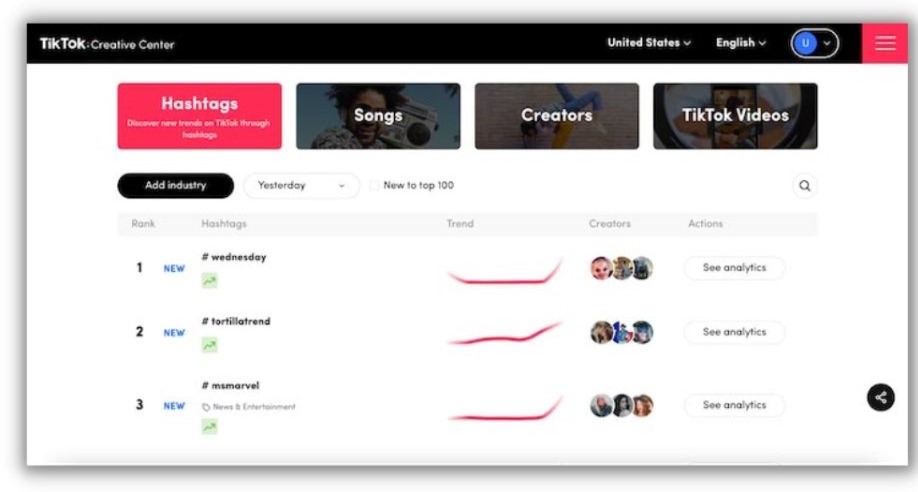
You’ll find trending hashtags, songs, and popular videos to fuel your content calendar.
6. Start big and taper
If you’ve just created your TikTok account, make a splash by posting as much content as possible early on. That’ll do three things to catapult your success:
- Give you more chances to land on the FYP
- Give the TikTok algorithm plenty of content to index
- Give you more data to learn from quickly
Try to create enough content to post at least once per day for the first two or three weeks that you’re on the platform. Then you can taper off to see if your videos are still getting likes and your follower count keeps growing.
7. Batch and schedule content
Assuming your entire job isn’t creating videos for TikTok, you probably have to jump in and out of the app to edit and post your content. Switching contexts from other tasks to TikTok like that can slow you down.
An alternative is to create posts in batches, then schedule them throughout the week or month. That would gain you some efficiency in your workflow.
Luckily, TikTok has a content scheduler in the desktop version of the app.
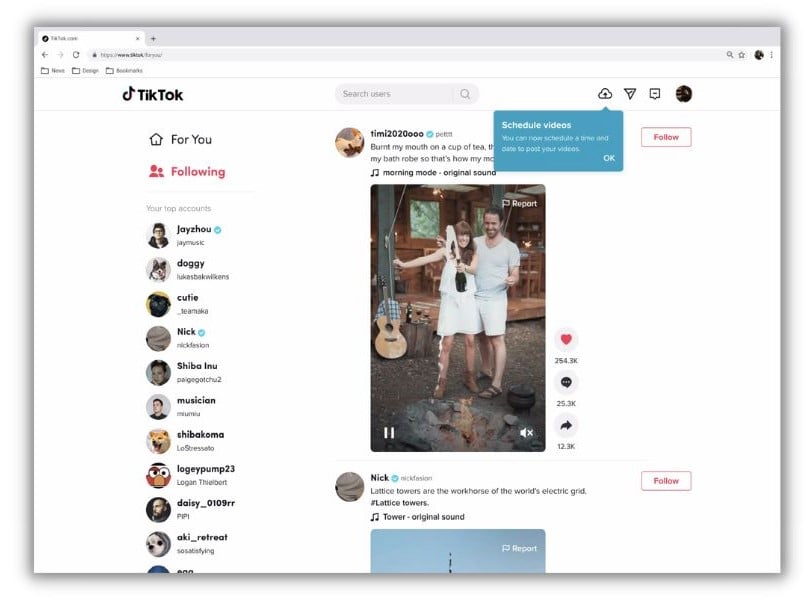
If you’re not sure when to schedule content, this guide will help you find the best time to post on TikTok.
Find your flow on TikTok
Should you post on TikTok every day? As long as you’re posting great content, it probably won’t hurt. But if that cadence burns you out, then take it easy on yourself and spread out your posts. It’s always better to create and share fewer good posts then more meh ones.
While you’re figuring out how often you should post on TikTok for your goals, remember these tips to make it easier:
- Use Stitch and Duet
- Work with other brands and creators
- Repurpose content
- Use TikTok ads
- Jump on trends
- Start big and taper
- Batch and schedule content








